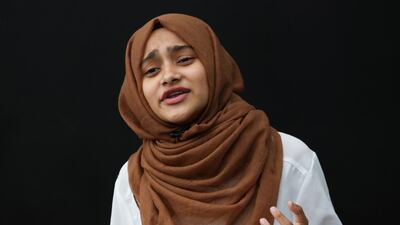The Middle East has often featured high on the bill at the Edinburgh Festival. Authors who examine the history of the region, plays about war and conflict, and performers who come from or are influenced by the Arab world regularly feature in the programmes.
At this year’s Edinburgh International Book Festival, which runs from August 13 to 29, the region has its own strand – “Redrawing the Middle East” – focusing on a hopeful future.
Saudi novelist Raja Alem, winner of the 2011 International Prize for Arabic Fiction for her novel The Dove's Necklace, will discuss her book and the customs of Mecca from a female perspective on August 17.
In a welcome move away from concentrating on conflict – as if the Middle East is a problem to be solved rather than a culture and region to enjoy – Mostafa Salameh, the son of Palestinian refugees, will talk about his book Dreams of a Refugee, which tells his remarkable story about how he was driven to climb Mount Everest (August 18).
At The Edinburgh Festival Fringe, which begins on Friday, August 5, and runs until August 29, Syrian guitarist Ayman Jarjour’s classical concert on Saturday will feature Spanish, American and Middle Eastern music in the evocative setting of Stockbridge Church.
The performance programme at the Fringe seems to imply that the unrest in the region is not the fodder for comedy and satire it used to be. Stand-ups love jokes about the Middle East conflict and its consequences in the West, but there are fewer performers or comic plays devoted to it this year.
Lifted (August 5 -27, excluding August 7 and 21) is an exception. The gritty, dark comedy, set in a Scottish prison cell, is a mystery about how two young men – a Scottish Pakistani and a Kuwaiti – ended up behind bars. The two-hander asks: is it because they're starting a new caliphate – or because they don't fit in?
Shoot the Women First (August 16-28) is another black comedy. The debut play by Irish comic Mary Bourke is set in the modern day and depicts women mercenaries in a Tehran hotel discussing their precarious future.
Shaking up preconceptions, especially around women, is a common Fringe theme. Rapture (August 8-12), by A-Team Arts House of Talent, lifts the veil on Muslim women.
“You see a hijab – I see a rapper,” reads the play’s blurb. Through hip-hop and personal accounts, the lives of young Muslim women in London are revealed to be different from what you might think.
Fringe First Award-winning playwright Henry Naylor also makes us question women and war in Angel (August 3-29, excluding August 17), the final chapter of his Middle Eastern trilogy of plays. The one-woman performance was inspired by the story of a young female law student-turned-sniper, known as the Angel of Kobani. Discovering she had a talent for killing, she is said to have killed more than 100 men in the Syrian wars.
Conflict in the Middle East inevitably inspires playwrights at the Fringe. The Blue Box: Memories of the Children of War (August 8-13) is a bilingual Arabic/English production that received a standing ovation during its run in Kuwait for its heartfelt portrayal of children affected by war. Based on a book by teenage author Emma Abdullah, it has been brought to the Fringe by One World Actors Centre, the same company that presented the much-praised Antigone: An Arabian Tragedy last year.
Words aren't always necessary to portray Middle Eastern life. The double bill The Rooster and Partial Memory (August 5-14, excluding August 8) is performed by the El-Funoun Palestinian Dance Troupe and features music by El-Funoun and Syrian poetry by Nizar Qabbani.
Partial Memory is a dance solo by Ata Khattab, depicting memories of his childhood in occupied Palestine.
Senegalese singer Youssou N'Dour has a large following in the Middle East, in part due to his album Egypt, which he made with the country's Fathy Salama Orchestra. N'Dour is making a rare appearance in Scotland, on August 24 at the main Edinburgh International Festival, with his funky beat that combines Senegal's ancient musical traditions and influences ranging from Cuban rumba and hip-hop to jazz and soul.
• Edinburgh International Festival, August 5-29, www.eif.co.uk
• The Edinburgh Festival Fringe, August 5-29, www.edfringe.com
• Edinburgh International Book Festival, August 13-29, www.edbookfest.co.uk
artslife@thenational.ae

